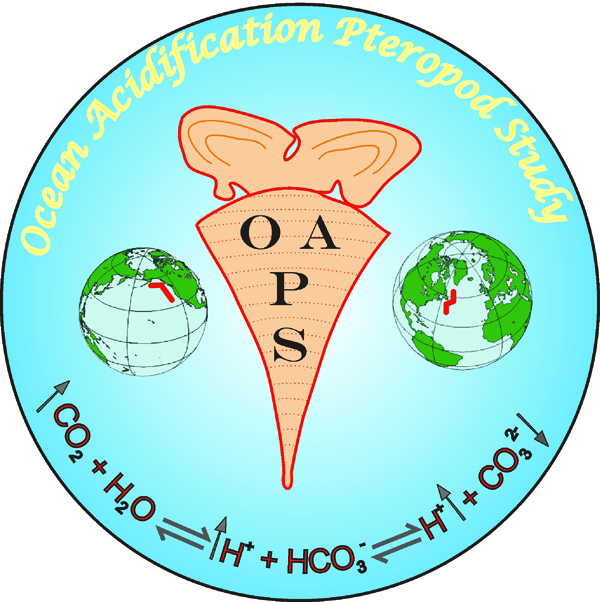 ©2020 Biological and Chemical Oceanography Data Management Office.
©2020 Biological and Chemical Oceanography Data Management Office.Funded by the U.S. National Science Foundation
Modified version of the NSF award abstract:
The impact of ocean acidification on marine ecosystems represents a vital question facing both marine scientists and managers of ocean resources. Thecosome pteropods are a group of calcareous planktonic molluscs widely distributed in coastal and open ocean pelagic ecosystems of the world¡¦s oceans. These animals secrete an aragonite shell, and thus are highly sensitive to ocean acidification due to the water column's changing carbonate chemistry, and particularly the shoaling of the aragonite compensation depth at which seawater becomes corrosive to aragonite. In many regions, however, relatively little is known about the abundance, distribution, vertical migratory behavior, and ecological importance of pteropods. Assessing the likely ecosystem consequences of changes in pteropod dynamics resulting from ocean acidification will require a detailed understanding of pteropod distribution and abundance relative to changing aragonite saturation in the water column.
The primary objective of this project is to quantify the distribution, abundance, species composition, shell condition, and vertical migratory behavior of oceanic thecosome pteropods in the northwest Atlantic and northeast Pacific, and correlate these quantities to hydrography and concurrent measurements of carbonate chemistry, including vertical and horizontal distributions of aragonite saturation. In particular, the project will capitalize on present-day variability in the depth distribution of aragonite saturation levels within and between the Atlantic and Pacific Oceans as a "natural experiment" to address the hypotheses that pteropod vertical distribution, species composition, and abundance vary as the compensation depth becomes shallower. Secondary objectives are to develop acoustic protocols for the remote quantification of pteropod abundance for future integration into ocean acidification monitoring networks, and to characterize carbonate chemistry and nutrients along portions of two WOCE/CLIVAR Repeat Hydrography transects (A20 in the Atlantic and P17N in the Pacific) to identify decadal-scale changes in the carbonate system. These hypotheses and objectives will be addressed through two cruises along survey transects between 35 and 50 degrees North in the northwest Atlantic and northeast Pacific involving a combination of station-work and underway measurements, and a comprehensive array of instruments, including acoustic, optical, towed net, hydrographic, and carbonate chemistry sensors and sampling systems.
This highly inter-disciplinary project, combines expertise in zooplankton ecology, acoustics, and marine chemistry. The proposed work will result in a detailed baseline understanding of variability in the horizontal and vertical distribution, as well as species composition, of thecosome pteropods in the northwest Atlantic and northeast Pacific, making a key contribution to zooplankton ecology generally. In addition, by quantifying the response to current spatial variability within and between the Atlantic and Pacific Oceans, the project will provide important information on the likely response of pteropod distribution to future changes in the vertical distribution of aragonite saturation levels, a necessary component in modeling the impacts of ocean acidification on marine ecosystem function, services, and resources.
Ocean acidification is increasingly appreciated as an urgent societal concern. Thecosome pteropods are key prey for a variety of commercially-exploited fish species, and the improved understanding the PIs seek of pteropod distribution and likely response to changing water column carbonate chemistry will have important implications for our understanding of potential effects of ocean acidification on marine resources.

Lead Principal Investigator: Gareth Lawson
Woods Hole Oceanographic Institution (WHOI)
Co-Principal Investigator: Andone C. Lavery
Woods Hole Oceanographic Institution (WHOI)
Co-Principal Investigator: Zhaohui Aleck Wang
Woods Hole Oceanographic Institution (WHOI)
Co-Principal Investigator: Peter H. Wiebe
Woods Hole Oceanographic Institution (WHOI)
BCO-DMO Data Manager: Ms Dicky Allison
Woods Hole Oceanographic Institution (WHOI BCO-DMO)
BCO-DMO Data Manager: Nancy Copley
Woods Hole Oceanographic Institution (WHOI BCO-DMO)
Ocean Carbon and Biogeochemistry [OCB]